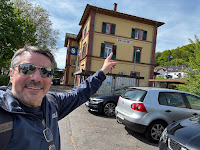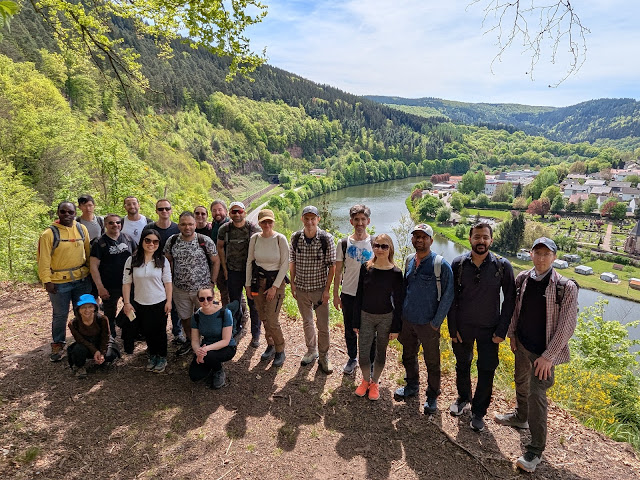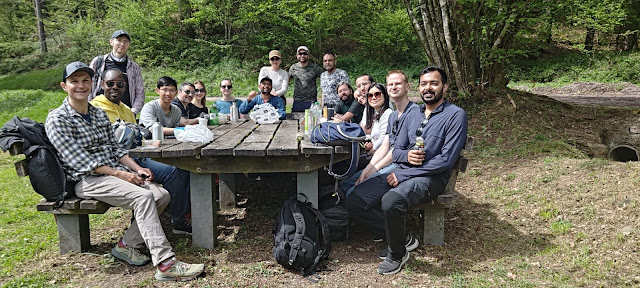Hiking Through the Neckar Valley,
Borders Are Left at the Trailhead
By Justin T. Carreño
Justin T. Carreño is a writer who lives in Germany.
The morning mist clung stubbornly to the hills of the Neckar Valley—
the kind of damp, quiet fog that makes everything feel softer, slower.
It was April, and spring was just beginning to stretch out its limbs in
southern Germany. From the medieval village of Hirschhorn, with its
quiet castle perched above the river, our hiking group set out for a
day of fitness, fresh air, and, as it turned out, fellowship—boots
hitting dirt with that shared rhythm only a long trail can create.
We were a colorful mix: Germans, of course, but also people from
further afield. Chu Li, a cheerful Chinese business consultant;
Vladimir, the group leader, a rugged Russian IT manager with a
dry wit; Natalia, a Ukrainian whose smile never quite left her face,
even on the steep inclines. There was Hossam from Egypt, who
carried dates in his pack and offered them freely. Lien, a Vietnamese
pharmacy student with a camera always half-raised. A quiet,
thoughtful man named Sami, who had left Syria to pursue medical
school in Heidelberg, still carried his past in his eyes. And there
were two Indian men, unrelated by blood but quick to bond over
a shared culture and distant home.
Then there was the Jamaican hiker. His story of moving to
Germany for a fresh start caught me off guard. I asked why he
chose Germany over the U.S., which is often a more common
destination for Jamaicans. He shrugged and said the U.S. didn’t feel
like a good place anymore. “Germany is safer,” he added, “and the
work-life balance, the worker protections—they’re better.” He
hadn’t realized I was American until he asked, “Where are you from?”
“The States,” I said.
He looked momentarily embarrassed, muttered an apology, but I
just smiled. “I understand.”
Sometimes, the world feels smaller than we think.
I then found myself walking alongside Natalia. I wanted to talk to her about her experience leaving Ukraine, but I held back—convinced I already knew her story.
“How long have you been in Germany?” I finally asked.
“A couple of years,” she replied.
That matched the beginning of the war. I told her, "I stand with you.
I stand with Ukraine." She smiled and thanked me. I didn’t press further.
She steered the conversation toward the hike—the breathtaking
views, the crisp air. She spoke, in broken English, with quiet pride
about living nearby, having this wilderness at her feet, and still
being close enough to work in Heidelberg. A little reserved, but
cheerful. Present. Living in the moment.
Later, during a break, Hossam handed me a date. I accepted and
asked what had brought him to Germany. He said he worked as an
engineer. When I asked if it offered more opportunity than Egypt,
he nodded. “Egypt used to be freer in the ’90s and early 2000s,”
he said. “Then things got more conservative. It was strange to
suddenly see women wearing burqas everywhere.”
“Like Iran?” I asked.
“Yes,” he said, “but not as dramatic. Still, corruption grew, opportunity
shrank. It’s safer here. And I can build a better life.”
And then there was me—the lone American, tagging along in worn
boots, with more curiosity than German vocabulary, and a quiet
sense of wonder at the people I was walking beside.
The trail to Eberbach wound through pine forests and rocky
outcrops, hills rising and falling like breath, high above the Neckar
River. Somewhere between the second climb and a moss-covered
overlook, I found myself walking beside Vladimir. I glanced at him
and said, “I know you.”
“I thought so,” he replied. “We hiked together in 2020, during the
pandemic, when there was nothing else to do.” He explained that the
group leader of that old hiking club had quit, so he started his own.
I asked where he was from in Russia.
“The Far East,” he said.
“Siberia?
”
He smiled. “What most of the West calls Siberia, we divide into
Siberia and the Far East."
Maybe it was the quiet, or the rhythm of shared effort, but eventually
I asked—carefully—what it felt like, being Russian these days. The last
time we’d met, it was before Russia invaded Ukraine.
He didn’t flinch. Just sighed. “No one wins in this. Not really. You think
I’m proud? My cousin left Russia last year. It’s a mess—but it’s not
the people. It’s the ones at the top, playing games with borders while
we carry the weight.” He went on to describe how different
socio-economic classes in Russia see the war through very different
lenses. Then he kicked a stone off the trail and kept walking. “But hey… beautiful trees, right?”
I nodded. And for a while, we just walked.
Natalia caught up, teasing Vladimir for slowing down. They bickered
playfully in a strange mix of Russian, Ukrainian, and German—the kind
of language only shared history, good and bad, can build. Behind us,
I heard Lien laughing at something Hossam had said in broken
Vietnamese. Chu Li was already scouting ahead, GPS in one hand,
pointing out edible mushrooms no one else trusted.
By the time we reached Eberbach, the sun was warm on our backs,
casting long shadows through budding trees. Our legs ached, our
feet were blistered, but no one complained. We were hungry. Chu Li
led us down a narrow side street to a small Chinese restaurant she
swore by—family-run, with dumplings that reminded her of home.
We squeezed into mismatched chairs, dusty and tired, our table
overflowing with dishes and tea. Someone passed soy sauce. Someone
else poured jasmine tea. Chopsticks clinked, laughter echoed—and for
a while, everything else fell away.
An American. A Russian. A Ukrainian. A Chinese woman. Vietnamese and
Syrian students. Indians. An Egyptian. A Jamaican. And a handful of
Germans, laughing along with us.
There was something undeniably poetic about it: the way a mountain
trail could level everyone, the way a shared meal could remind us
that, beneath the borders and languages and losses, we’re all just
people. Hungry. Tired. Human.
After dinner, we caught the train home, heading in different directions—
but somehow closer than when we’d started. Maybe peace isn’t built
by treaties or grand political gestures. Maybe it’s a moment
like this: walking the same path, listening when someone speaks.





